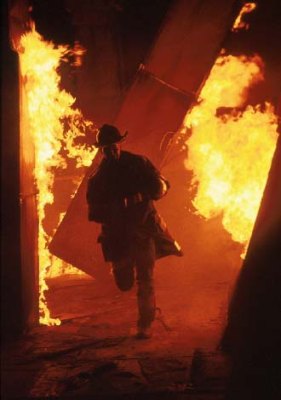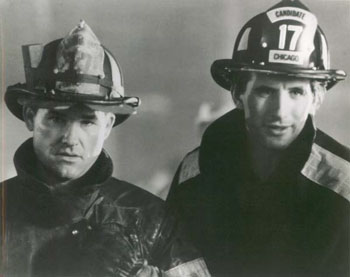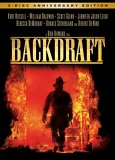| Reviews & Columns |
|
Reviews DVD TV on DVD Blu-ray 4K UHD International DVDs In Theaters Reviews by Studio Video Games Features Collector Series DVDs Easter Egg Database Interviews DVD Talk Radio Feature Articles Columns Anime Talk DVD Savant Horror DVDs The M.O.D. Squad Art House HD Talk Silent DVD
|
DVD Talk Forum |
|
|
| Resources |
|
DVD Price Search Customer Service #'s RCE Info Links |
|
Columns
|
|
|
Backdraft: 2-Disc Anniversary Edition

It isn't that Backdraft presents firemen as perfect, idealized human beings, worthy of our adoration. Far from it. The characters in Backdraft, though drawn along lines of familiar melodrama, are at best, imperfect people, and certainly not worthy of our unquestioning identification. No, where our respect factors in, is in the amazingly realistic depictions of the fire sequences, and the notion, that comes across quite strongly in the film, that despite personal failures, these men do not fail when it comes to their jobs. They are here to protect and to serve the community, and nothing will get in the way of that. Indeed, a Hawksian world of professional men who give no quarter when it comes to their profession, is married to admittedly hackneyed subplots of sparring brothers, and a cold-blooded arsonist, to create a surprisingly powerful melodrama that becomes much more in its totality, than its individual parts might suggest.
In 1971, young Brian McCaffrey (William Baldwin), having gone along for a ride on his dad's Chicago fire truck, witnesses him incinerated by a huge fiery explosion. The story then jumps forward almost twenty years. After drifting from job to job, Brian returns to the fire department, determined to prove to himself that he can cut it as a firefigher, while beating back the demons that visit him concering his father's death. Unfortunately, he is unable to escape the influence of his brother, Stephen "Bull" McCaffrey (Kurt Russell), a hard-charging professional firefighter who is also trying to live up to his dead father's image. Personal problems beset both brothers, particularly Stephen, who's separated from his wife and young son. Working together in the same company, Stephen's discouragement pushes his brother out of working on the line. Brian accepts an appointment by Alderman Swayzak (J. T. Walsh), who has been cutting back on the fire department budget, to work with Fire Inspector "Shadow" Rimgale (Robert De Niro). Rimgale is on the trail of a serial arsonist who is using the deadly technique of setting a "backdraft," which can instantly kill his intended targets.
Working from former firefighter Gregory Widen's script, director Ron Howard has fashioned an earthy melodrama worthy of the kind of "B" potboiler Warner Bros. turned out regularly in the 1930's and 1940's. The professional tension between older and younger brother is as old as the hills (I'm surprised they didn't throw in a fight for the same woman, as well). But as previous blockbusters from hoary old premises had proved (Top Gun, An Officer and a Gentleman), if packaged correctly (and delivered with a straight face), audiences would show up. Backdraft certainly drew in the patrons, but the movie continues to have an impact on new viewers precisely because the filmmakers obviously took it so seriously. Pulpy melodrama, yes. But done with absolute realism and conviction.
And make no mistake: it's the hyper-realistic fire scenes that really impress. Allen Hall, Scott Farrar, Clay Pinney, and Mikael Salomon create visual and special fire effects that have yet to be equaled on the screen. All the more amazing for newer viewers, these effects are in essence, "real." There were no CGI effects used (director Howard, in a new introduction to the film, makes a point of stating this, perhaps because it's become so prevalent for people to think all special effects are computer generated now). There's an amazing power and beauty to the fire scenes which worked particularly well on the big screen. Equally important is the sound design by Gary Rydstrom, which creates a terrifying aural accompaniment to the fire sequences. Composer Hans Zimmer contributes a soaring, inspirational score that lends true awe to the action scenes (although, I must admit that hearing the score now, I'm constantly reminded of a favorite TV show, Iron Chef, which borrowed the same theme). These fire scenes knit the whole film together, and provide a believable backdrop for the other, more familiar elements of the movie to play out. Sure, the corruption and serial arsons angles don't particularly work; their integration is at best, clumsy. There's a silly love scene atop a fire truck that's ill-advised. And there's a regrettable MTV video moment -- complete with an awful, booming rock ballad --that squarely says: 1990 concession to music executives who want to maximize the profits on the film. But I defy most hard-hearted moviegoers, who've seen it all before, to resist Russell saying, "That's my brother," as he watches Baldwin battling a raging fire. Backdraft, through these transcendent fire sequences, successfully enriches its pulp origins to become a visual statement supporting the idea of "fireman as iconic hero."
The performances are quite good, with Russell and De Niro, as well as Donald Sutherland in a small but pivotal role as a fire bug, walking away with the acting honors here. Russell brings his competitive, all-American leadership qualities to the role of Stephen, along with that always present, underlying tension and anger simmering below his confident demeanor. Russell continues to have a solid, surprising career. He's never been a Tom Cruise or Harrison Ford at the box office, but looking back at this film roles, he's had more than his fair share of cult and mainstream audience pleasers (The Computer Wore Tennis Shoes, The Deadly Tower, Elvis, Used Cars, Escape from New York, The Thing, Silkwood, Big Trouble in Little China, Tombstone, Stargate, Breakdown, Dark Blue, Miracle, Dreamer). De Niro and Sutherland are particularly good in their main scene together; this material is compelling enough to make one wish they had had their own feature together, exploring this subplot.

The DVD:
The Video:
For this 15 year anniversary edition, the picture has been digitally remastered, and it shows. A wealth of detail, particularly in the fire sequences, shows up in the anamorphic widescreen 2.35:1 image. Colors are saturated, with deep blacks. It looks as good as it did in the theaters.
The Audio:
The English Dolby Digital 5.1 blows the hell out your sound system; it's an amazing aural experience when the fire sighs and heaves, roaring into your living room. There are alternate French and Spanish 2.0 Dolby tracks. English, French and Spanish subtitles are available, also.
The Extras:
There are loads of new bonus features for this anniversary edition of Backdraft. At the beginning of Disc One, before the movie, there's a short introduction by director Ron Howard, emphasizing the legacy of the film, along with assuring the audience that no computer effects were used in the making of the film. Considering how new audiences seem to only know computer effects, it's good to have this right up front, to appreciate the reality of the special and visual effects. Be careful, though; if you haven't seen the film, I would recommend watching this intro after the film. There are a few shots that may spoil the film experience for you.
Following the movie, there are over 44 minutes of deleted scenes. There is no explanation over the scenes, nor any reason given why they were deleted. I remember the first time I saw deleted scenes from a particular favorite film of mine, and the sense of disappoint over them still lingers. Deleted scenes usually wind up deleted for a good reason; so, these may be fun to fill in the some of the background on the story, but essentially, they're just filler. They are taken from video masters, so the picture quality really suffers.
On Disc Two, there are five bonus documentaries that give a fairly decent look into the production of the film. Igniting the Story details the evolution of the script, and the search for special effects that can bring the story to life. It also includes an unfortunate, ill-thought out comment from producer Brian Grazer, who essentially besmirches police officers and military men, questioning whether they can ever be viewed entirely sympathetically in a film. It's a stupid comment from a 1990 interview, and I'm surprised it was left in this documentary. As well, composer Hans Zimmer makes a similar statement, saying that "there's nothing ambiguous about rooting" for firefighters, as opposed to the police or the military. Again, a scurrilous comment, combined with Grazer's thoughts, which give an insight into how some Hollywood artists really view authority figures. Bringing Together the Team shows the casting process, including new interviews with several cast members. Russell's interview clips are from 1990, though, and there's no chat whatsoever from De Niro. It does get a bit thick, listening to Hollywood actors going on and on about looking for their motivations -- but, that's actors for you. The Explosive Stunts and Creating the Villain: The Fire give detailed insights into the visual and special effects that created the look of Backdraft. And finally, the best documentary here, Real-Life Firemen, Real-Life Stories presents a few minutes with the real life fire station Number 73, from Santa Clarita, California. To hear these real firefighters describe what it's like to crawl through a smoke-filled building, totally unaware what is in front of your face, and unaware what you're crawling over, trying to find the source of a fire, is absolutely harrowing (some might say even more than the film). They do, however, give the film high marks for showing the average life of a fireman, and, except for the lack of blinding smoke (necessary to actually film the sequences), the fire scenes, as well. Weirdly, there is no trailer for Backdraft. If it's hidden somewhere as an Easter egg, somebody let me know, because I couldn't find it.
Final Thoughts:
Backdraft is a straightforward, muscular take on an old chestnut, made mythic by awesome special and visual effects, and a full-blooded soundtrack. Its message of brotherhood and sacrifice, perfectly embodied by the firefighting family framework, rises above the average actioner incarnation, to stick with you long after the film is over. Highly recommended.
Paul Mavis is an internationally published film and television historian, a member of the Online Film Critics Society, and the author of The Espionage Filmography.


|
| Popular Reviews |
| Sponsored Links |
|
|
| Sponsored Links |
|
|
| Release List | Reviews | Shop | Newsletter | Forum | DVD Giveaways | Blu-Ray | Advertise |
|
Copyright 2024 DVDTalk.com All Rights Reserved. Legal Info, Privacy Policy, Terms of Use,
Manage Preferences,
Your Privacy Choices | |||||||












